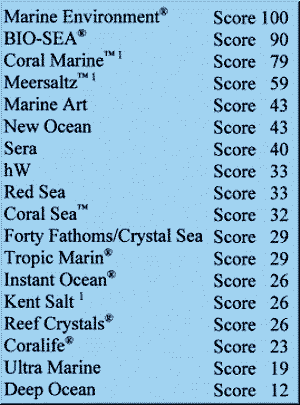B
bonita69
Guest
THINGS YOU DON'T KNOW ABOUT SALT MIXES
All salt mixes are not alike. They vary in quality of starting materials, percentages of components and additional additives not normally found in sea water.
STARTING MATERIALS:
The major component of salt mixes is sodium chloride or better known as table salt. It is mined in enormous quantities and purified in different ways. For aquarium salt, they use a "technical grade". An old joke said "Technically it's salt" and it is 99.+ % pure. The other percent is comprised of other minerals and things like dust and clay. When you mix up a batch for your tank you often find sediment in the bottom of the mixing tank if you turn the pump off. This is harmless like dust on the furniture. There are other chemical grades listed below FYI. Considering the composition of natural seawater, technical grade is good enough and it is cost effective. If a salt manufacture says they use more pure chemicals than the others, it's only a fraction of a percent more pure and has little or no effect on the final product. Other components are usually no more pure than lab grade.
.
QUALITY CONTROL:
This is one aspect few think about. There are specific percentages of each part of a saltwater mix. Let's take iodide for example. Natural seawater has 0.06 % iodide content. This amounts to 1.6 grams of sodium iodide added to a 1000 pounds of sodium chloride. If you want to cut costs or you don't care about consistency, a few tenth's of a gram makes a significant difference and iodide is much more important than calcium.
.
DO YOU REALLY KNOW WHAT'S IN YOUR SALT MIX?
Let's pretend you mix 100 pounds of sodium chloride (table salt), 5 pounds of calcium chloride (Turbo Calcium available at Home Depot in 50 lb bags under $10)) and 25 pounds of magnesium sulfate (Epsom Salts). This is about enough mix for 450 gallons. When you test the water, calcium will be 400+, pH will be 8.3, and magnesium will be really high. Everything you testing maniacs want will be there but it will be the worst mix you could get. My point is: TEST KITS REALLY DON'T TELL THE WHOLE TRUTH.
All salt mixes are not alike. They vary in quality of starting materials, percentages of components and additional additives not normally found in sea water.
STARTING MATERIALS:
The major component of salt mixes is sodium chloride or better known as table salt. It is mined in enormous quantities and purified in different ways. For aquarium salt, they use a "technical grade". An old joke said "Technically it's salt" and it is 99.+ % pure. The other percent is comprised of other minerals and things like dust and clay. When you mix up a batch for your tank you often find sediment in the bottom of the mixing tank if you turn the pump off. This is harmless like dust on the furniture. There are other chemical grades listed below FYI. Considering the composition of natural seawater, technical grade is good enough and it is cost effective. If a salt manufacture says they use more pure chemicals than the others, it's only a fraction of a percent more pure and has little or no effect on the final product. Other components are usually no more pure than lab grade.
.
QUALITY CONTROL:
This is one aspect few think about. There are specific percentages of each part of a saltwater mix. Let's take iodide for example. Natural seawater has 0.06 % iodide content. This amounts to 1.6 grams of sodium iodide added to a 1000 pounds of sodium chloride. If you want to cut costs or you don't care about consistency, a few tenth's of a gram makes a significant difference and iodide is much more important than calcium.
.
DO YOU REALLY KNOW WHAT'S IN YOUR SALT MIX?
Let's pretend you mix 100 pounds of sodium chloride (table salt), 5 pounds of calcium chloride (Turbo Calcium available at Home Depot in 50 lb bags under $10)) and 25 pounds of magnesium sulfate (Epsom Salts). This is about enough mix for 450 gallons. When you test the water, calcium will be 400+, pH will be 8.3, and magnesium will be really high. Everything you testing maniacs want will be there but it will be the worst mix you could get. My point is: TEST KITS REALLY DON'T TELL THE WHOLE TRUTH.




